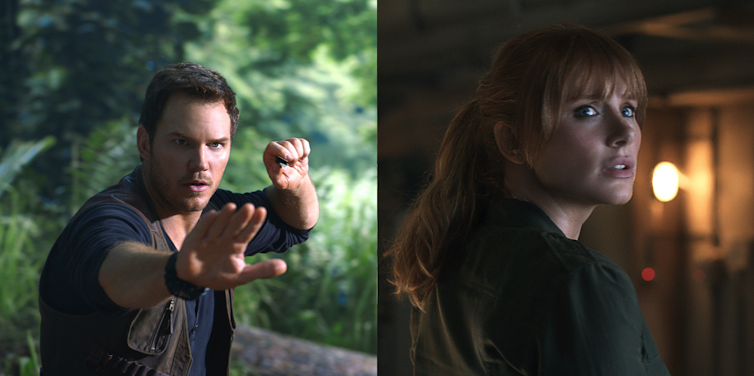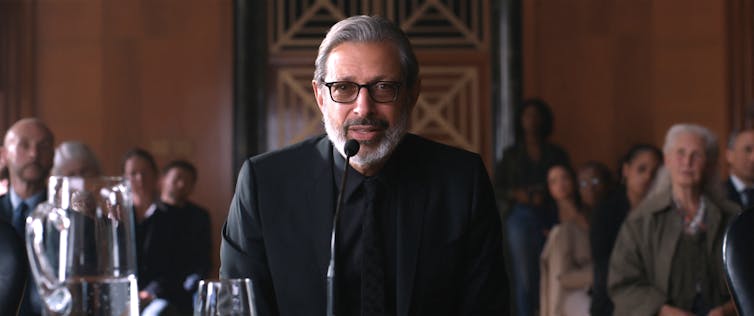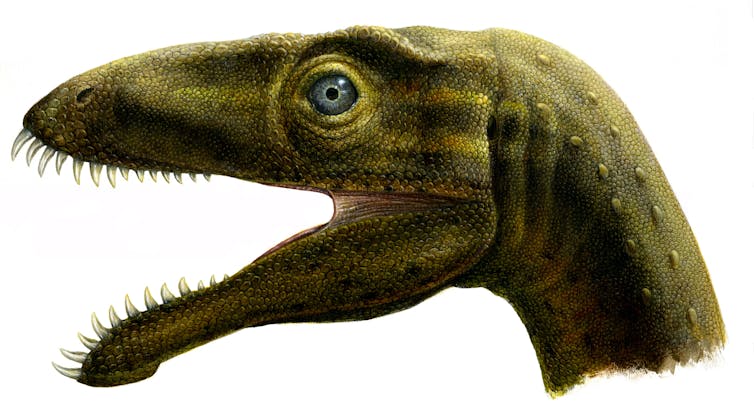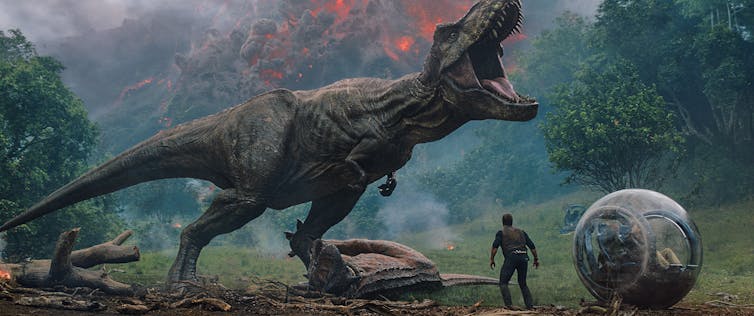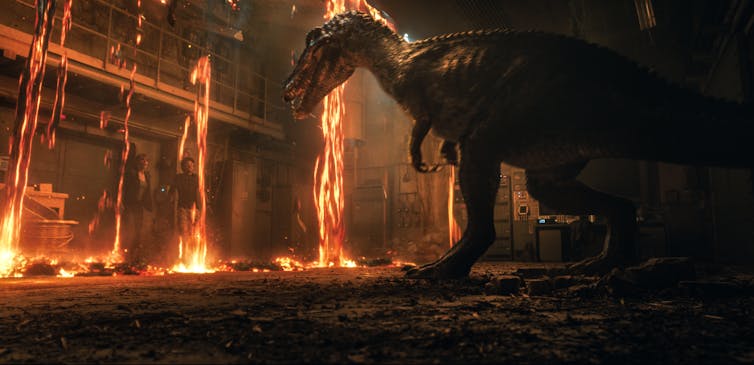 There’s a new kid in town in Jurassic World: Fallen Kingdom. (Universal Studios and Amblin Entertainment, Inc. and Legendary Pictures Productions, LLC.)
There’s a new kid in town in Jurassic World: Fallen Kingdom. (Universal Studios and Amblin Entertainment, Inc. and Legendary Pictures Productions, LLC.)
Owen Grady (Chris Pratt) and Claire Dearing (Bryce Dallas Howard) return in another swinging tale of unpredictable and unreasoning monsters, brought back from extinction and on the rampage, leaving a trail of mindless destruction across an island on the brink of natural disaster.
But this is a more thoughtful ride through the well-crafted Spielbergian universe, founded on a solid (and enjoyably false) premise, populated with spectacular creatures and flawed humans battling it out for survival, with the predictably plucky clever kid thrown in to make sense of it all.
Claire Dearing has seen the error of her cold corporate ways from the previous Jurassic World (2015). She has invested in a pair of sensible outdoor shoes and relaunched herself as a dinosaur conservationist, living and breathing the ethical conundrum of attempting to preserve a genetically resurrected species.
Jeff Goldblum’s character Ian Malcolm makes all too brief an appearance, providing an authoritative philosophical take on the role these creatures play in our world, against the backdrop of commercialisation, senate enquiries, and unbridled consumerism.
“These creatures were here before us. And if we’re not careful, they’re gonna be here after us,” Malcolm says.
Remember Malcolm’s sage pronouncements from the original Jurassic Park (1993): “Life cannot be contained”, “Life breaks free”, and the now totemic “Life finds a way”.
These three environmentally sensitive catchphrases provide hope for survival, but for whom or what? If the Jurassic films show us anything, it is that life ultimately just wants to be left alone and not turned into an elite tourist commodity or set of biopharmaceutical experiments.
Claire and Owen are brought back together by an imminent volcanic eruption on Isla Nublar. As a born-again conservationist, Claire needs Owen to help rescue a Velociraptor he trained and named Blue.
Claire believes she is doing the right thing as a (presumably left-leaning) conservator of rare and endangered species. She can save a select few, but not all. This has caused at least one reviewer to tear up over the fate of a particularly vulnerable herbivore.
The right kind of life finds a way
If only a few could be saved, surely a Brontosaurus would be high on the list? But then, this manifest for a new-age ark has been strategically compiled.
We preserve and save what we value, whether it is species, money or collections. In this instance though, value is determined by strictly capitalist motivations: the black market for endangered species, part of which wishes to monetise the monsters as frontline soldiers in a (vestigial) arms race.
Wheeler-dealers (one with a rather Trumpian coiffure) are gleefully hatching plans to further modify and weaponise the creatures. Meat-eating theropods as natural born killers are their favourites, with herbivores like Ankylosaurus promoted for sale as nature’s “tanks”.
This is no longer humans versus nature. This is nature versus human consumer culture, and we already know who is probably going to win that fight. And the real monsters are much closer to home. They are us, the humans.
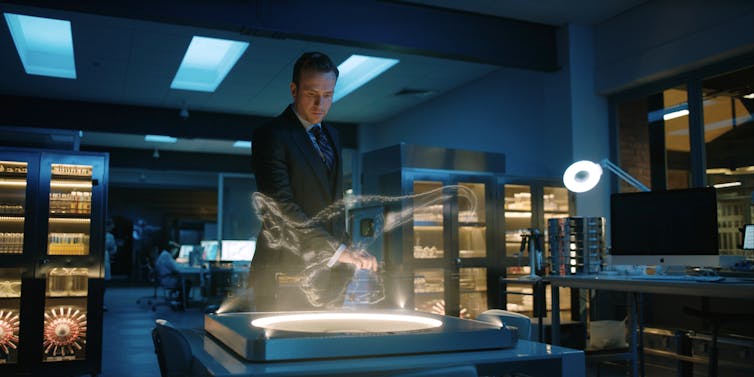 Let’s build a new dinosaur. (Universal Studios and Amblin Entertainment, Inc. and Legendary Pictures Productions, LLC.)
Let’s build a new dinosaur. (Universal Studios and Amblin Entertainment, Inc. and Legendary Pictures Productions, LLC.)
Dinosaurs have always been the stars of these movies. They are the reason we all go to see these films, and old favourites steal the limelight – the Tyrannosaurus and so-called Velociraptors.
As in the previous outings, the movie variety are much bigger than real Velociraptor (c. 1.5m) and lack feathers that are a feature of most well-preserved members of their family (the dromaeosaurids).
We also get to relish once again the sight of living Ankylosaurus, Gallimimus, Compsognathus, Stegosaurus, Brachiosaurus, Apatosaurus and Triceratops.
Making their first appearance in this movie are Sinoceratops, Carnotaurus, Baryonyx, Allosaurus, Stygimoloch and the manmade hybrid “Indoraptor”.
In the water we see a much overblown, chunky mosasaur with a forked tail, as recently reported in the scientific literature (if you watch very closely).
In the air we again find beefed-up pterosaurs such as Pteranodon, capable of lifting humans off the ground - pretty amazing for a beast that in life weighed up to 20kg. The real Pteranodon also did not have teeth.
The horned theropod Carnotaurus, has well-preserved skin impressions associated with the almost complete fossil skeleton, so we note that the skin texture of the movie beast is accurately depicted according to the scientific evidence.
Sinoceratops, a run-of-the-mill horned herbivore (ceratopsian), is seen briefly, as is Baryonyx, a close relative of the terrifying Spinosaurus that starred in Jurassic Park III.
A feisty little Stygimoloch, a dome-headed pachycephalosaur that loves to headbutt things (as fossil evidence supports), really steals the show in one hilarious scene.
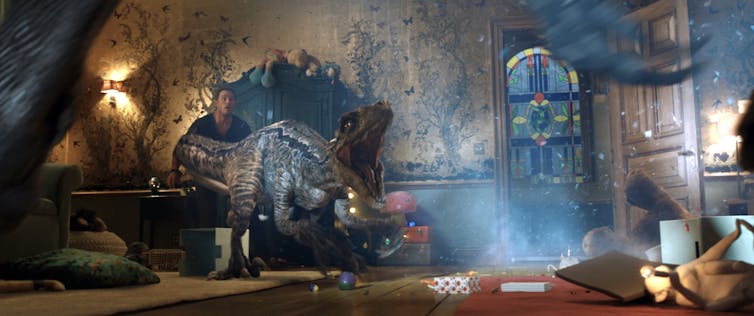 Say hello to Blue. (Universal Studios and Amblin Entertainment, Inc. and Legendary Pictures Productions, LLC)
Say hello to Blue. (Universal Studios and Amblin Entertainment, Inc. and Legendary Pictures Productions, LLC)
It had its moment in Australian scientific history when an anklebone thought to belong to Allosaurus was found at a site on the eastern Victorian coastline near Inverloch in 1981.
This caused great controversy as the beast was thought to be restricted to North America. Later it was shown that the anklebone likely belonged to a newly discovered Queensland Cretaceous theropod dinosaur called Australovenator.
We do see some straight, hairlike feathers on the head of “Indoraptor”, bringing it more into line with what we actually know of the skin covering of these kind of dinosaurs. The film-makers have done their homework.
Science is the big loser
Once again scientists are no longer seen as heroes or even used as major players in the narrative. They too succumb to the dominant market forces.
The loss of real palaeontologists – Sam Neil’s Alan Grant and Laura Dern’s Ellie Sattler, who had leading roles in the early movies – is a real shame, especially for kids looking for intelligent role models and exciting careers in science.
There is no clear resolution to this story, not with so much invested in the gaming spin-offs, high box office expectations, and a pending final instalment.
The show, and the cute merchandising, will go on.
It helps us to switch off from the somewhat pressing problem of extinction facing not just our own kind, but the thousands of other life forms on the brink of catastrophe caused by unbridled human consumption.
We are after all in the midst of the sixth great mass extinction event. This is a mess that humans have created, and where science provides clear solutions to how we can in future act to avoid catastrophe, yet politicians with their eyes fixed only on immediate economic benefit routinely ignore such advice.
John Long, Strategic Professor in Palaeontology, Flinders University and Heather L. Robinson, Research Associate & PhD Candidate, College of Humanities, Arts & Social Sciences, Flinders University
This article was originally published on The Conversation.
Jurassic World Related Stories:
- Next Edition of Moviebill Allows Fans To Bring Jurassic World Dinosaurs Home With Them
- Chris Pratt and Bryce Dallas Howard Help Jimmy Celebrate an Entire Week of "Jurassic World: Fallen Kingdom" on "The Tonight Show"
- Jurassic World: Can We Really Resurrect A Dinosaur?
- From Universal Pictures Home Entertainment: Jurassic Park 25th Anniversary Collection
- World Premiere of Jurassic World in Concert

